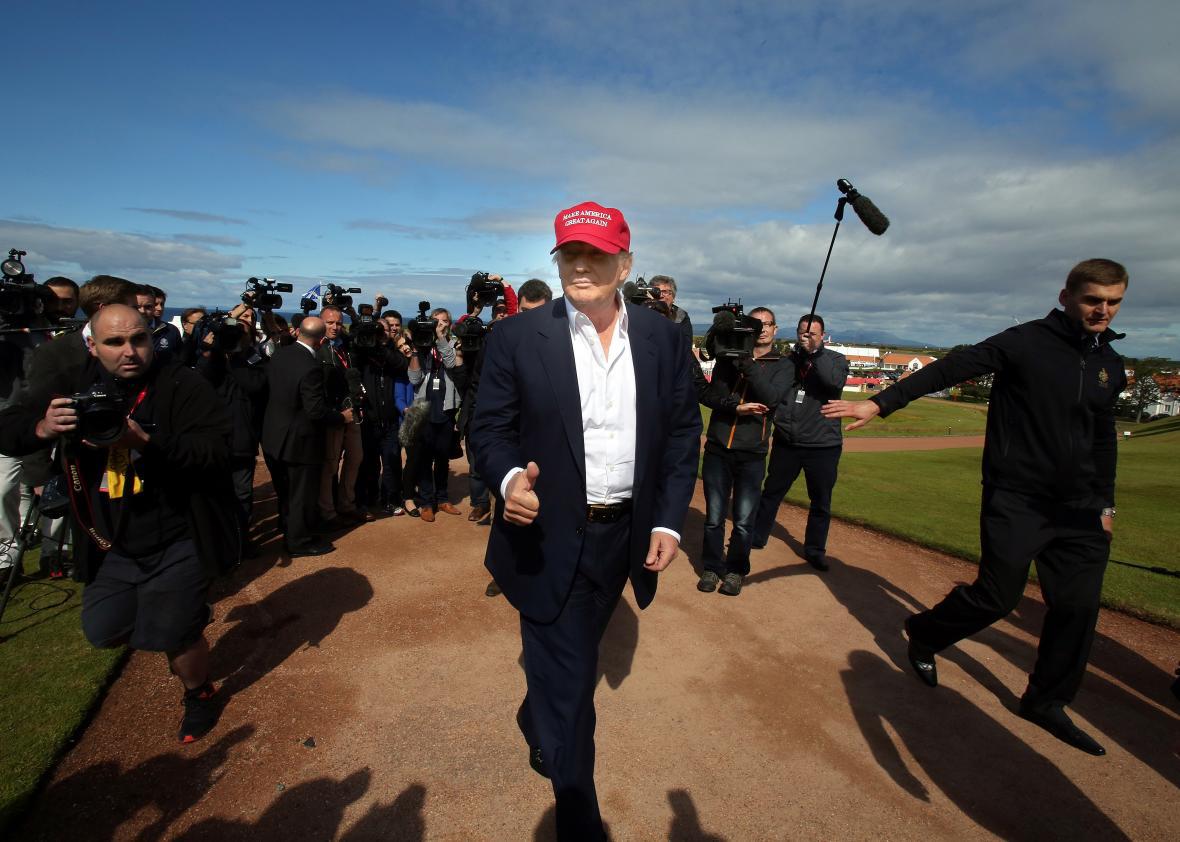Donald Trump rarely misses an opportunity to play the role of benevolent billionaire for personal gain. This past weekend, for instance, he made a surprise appearance at the National September 11 Memorial and Museum, where he used the visit and a $100,000 donation as a convenient excuse to attack Ted Cruz. “This is what ‘New York values’ are really all about,” his campaign said in a statement in a not-so-subtle jab at his Republican rival.
As should surprise pretty much no one by now, though, Trump’s apparent generosity doesn’t add up upon closer examination. Instead, it is built largely on a combination of free PR, clever branding, and accounting tricks, as the Washington Post illustrates this week. The paper recently completed a deep dive into the GOP front-runner’s charitable claims, and the ensuing report suggests that Trump has a very different definition of the word donation than the rest of us. After combing through a 93-page list produced by the Trump campaign this past summer to support his claim that he’s donated $102 million over the past five years, the paper found that not a single one of the 4,844 line items listed by the campaign “was actually a personal gift of Trump’s own money.”
Instead, the gifts either came from Trump’s eponymous foundation—which he hasn’t given any of his own cash to since 2009, according to the organization’s most recent tax filings—or from his businesses in the form of tax-break-granting land conservation agreements or smaller giveaways such as free rounds of golf, meals, or spa treatments. (This weekend’s donation to the 9/11 museum falls into the foundation category.) Oh, and then there were things like this (emphasis mine):
Trump listed a donation to “Serena William Group” in February 2015, valued at exactly $1,136.56. A spokeswoman for the tennis star said she had attended a ribbon-cutting at Trump’s Loudoun County, Va., golf course that year for a new tennis center. But Trump hadn’t donated to her charity. Instead, he had given her a free ride from Florida on his plane and a free framed photo of herself.
While the vast majority of individual contributions reported by Trump were resort giveaways, more than half of the $102 million came from unspecified “conservation easements.” As the Post notes, though, such deals don’t require the landowner to turn over the land in question—or even to stop profiting from it. In one such deal in California, for example, Trump agreed not to build homes near a golf course—and instead turned the property into a driving range.
Meanwhile, the only thing Trump seems to have given to the Donald J. Trump Foundation in recent years has been his name. According to the organization’s tax filings, Trump spends an average of somewhere between “minimal” and zero hours a week working with the group, and hasn’t donated personally to the foundation since 2008, as the AP reported last summer. Since the organization doesn’t have an endowment, it gives out grants only as a result of contributions that come in from other people—which, in effect, means Trump has been simply donating other people’s money for them for much of the past decade while taking most of the credit.
Trump, being Trump, tends to tailor the foundation’s giving to his own benefit. Among the groups he has selected recently are the V Foundation, the American Cancer Society, the Dana-Farber Cancer Institute, and the Leukemia and Lymphoma Society, all of which have held fundraisers at Trump properties. He also sent money to the American Conservative Union Foundation, which, as Politico has previously reported, helped land him prime speaking slots at CPAC events. And then there was my personal favorite line item, which was the second-largest donation on Trump’s list (emphasis mine):
In 2010, a man named Martin Greenberg was playing in a charity tournament at Trump’s course in Briarcliff Manor, N.Y. A $1 million prize was offered to anybody who got a hole in one. Greenberg did. But then, hours later, he was called back. The rules said the hole-in-one shot had to go 150 yards. But, according to court documents, Trump’s course had made the hole too short. Greenberg got nothing. He sued.
On the day that Trump and the other parties told the court that they had settled the case, the Donald J. Trump Foundation made its first and only donation to the Martin B. Greenberg Foundation, for $158,000. Both Greenberg and Trump’s campaign declined to comment.
The Trump camp declined to address most of the Post’s claims, though it did try to refute the idea that Trump hasn’t given from his own pocket—without actually offering any evidence that he has. “We want to keep them quiet,” Allen Weisselberg, chief financial officer of the Trump Organization and the treasurer of the Trump Foundation, told the paper. “He doesn’t want other charities to see it. Then it becomes like a feeding frenzy.”
